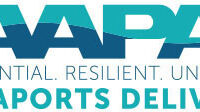Powering Workforces with Partnerships

Ports continue to forge deep connections with industry partners, labor unions, government, schools and communities to ensure a talented, upskilled and diverse workforce for the future.
By David Coburn
If idle hands are the devil’s workshop, there’s no need to look for mischief in the ranks of port officials charged with developing the workforce of the future.
From Long Beach to New Bedford, ports are facing workforce development challenges that are perhaps unprecedented, including the growing need for more tech-savvy workers as new technology transforms the way many port jobs will be done in the future.
Workers will need to be equipped with new skills as ports themselves are transformed by forces such as zero-emissions goals for cargo-handling and other equipment and the emergence of new maritime industries like offshore wind energy.
Add in the widening skills gap blamed on COVID-19, demographic and social forces – including the silver tsunami of retiring Boomers and urgent calls for greater diversity, equity and inclusion (DEI) – and the task of ensuring a skilled, talented and diverse workforce might seem truly daunting.
The good news: Ports are not taking on the workforce development challenge alone. With strong and ever-developing connections with local workforce development agencies, tenants and other industry partners, schools and universities, and community groups, they’re tackling the job together.
“We know we can’t do it alone, so we go partner with those we can work with to accomplish our mutual goals (on diversity and other metrics),” said Amy Tharpe, director of social responsibility for the Port of Oakland, which is tied to some 84,000 jobs in the area based on 2017 data.
Avin Sharma, director of labor relations and workforce development for the Port of Los Angeles, sees his role as being all about connecting – partnering with the port’s labor unions on safety training programs, educating policymakers on the port’s workforce needs, starting a dialogue with local school officials to collaborate on a port-specific curriculum, and forming the Port of Los Angeles Labor Collaborative to learn from 13 unions’ experience in workforce training and development.



